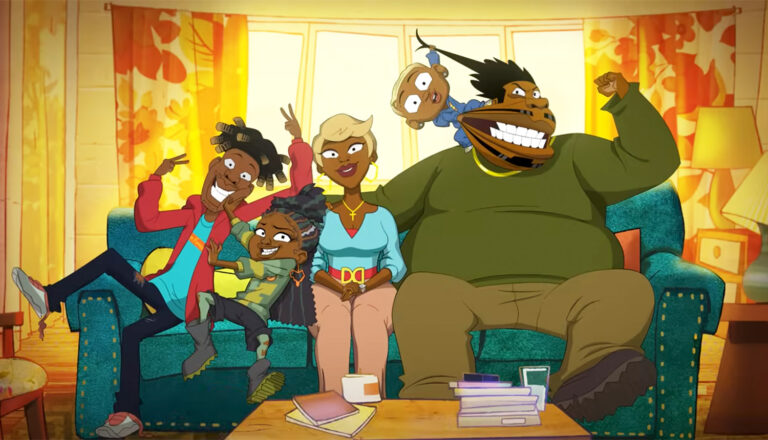
The land of The Witcher wasn’t always filled to the gills with ravenous monsters. But that doesn’t mean it was a particularly peaceful place, either.
According to The Witcher: Blood Origin, the continent was originally monster-free. It didn’t have any humans or dwarves wandering about, either. No, the whole place was populated by elves.
Alas, it was hardly one, big, pointy-eared family. Which is where the monsters come in. Literally.
About 1,200 years before the events of The Witcher, its kingdom of Cintra was Xin’trea, a country that had been locked in a thousand-year war with two other elvish kingdoms. But just as the three warring parties were just about to sit down and sign a peace treaty, a huge monster flew out of nowhere and wiped the signatories (and most of their elite protectors) right out of existence. Seems that a few other folks had a different idea of what Xin’trea’s future should look like.
A druid named Balor led the short-and-victorious continental coup. While he can’t rule the land outright just yet (being a lowborn magic-user and all, he’s plotting to change that, too.
But not everyone’s on board with Balor’s evil schemes. A band of seven outcast warriors, wizards and whatnot plans to right wrongs, dole out vengeance and … well, make Xin’trea a better country, I guess. But in so doing, they’ll upend the world as they know it, bringing about a place where humans and elves, dwarves and monsters all live together in various states of disharmony. And they’ll bring about the world’s very first Witcher—a born monster-hunter—too.
No spoiler, that last part: The whole story is told as a sort of flashback, with a mysterious woman telling the bard Jaskier (a bard who hung out with regular Witcher protagonist Geralt) that this is where this centuries-old story will lead.
Does it lead anyone worthwhile? In a word, no.
Fans and secular critics are giving The Witcher: Blood Origin a thumbs down. Rotten Tomatoes gives it a 33% approval rating, while fans at IMDb give it a paltry 4 out of 10 stars. Most say it ignores most of what made The Witcher (both the Netflix show and Andrzej Sapkowski’s originating books) special.
Plugged In, though, isn’t as concerned as what they left out as what they put in.
The blood and violence is R-rated and unremitting. The language might be even worse. Sexual dalliances—including same-sex romances—sully this landscape even more. And naturally, we’re dealing with plenty of magic and supernatural elements, including the apparent sacrifice of human beings.
The Witcher: Blood Origin features a staggering amount of hacking, slashing and bludgeoning. But alas, this fantasy story is a disappointment any way you slice it.
As the king of Xin’trea prepares to sign a critical peace treaty with two rival kingdoms (Pryshia and Darwen), a monstrous beastie sweeps down and promptly snuffs out the leadership of all three kingdoms. (That includes the fearsome clans that have traditionally safeguarded royal personages.) But some distance away, two skilled clan members have survived.
Fjall, from Xin’Trea’s Dog Clan, was banished for sleeping with the kingdom’s now-ruling princess. Éile, a member of the Raven Clan, left Pryshia under a cloud of disgrace and became a wandering bard known as the Lark. Now, they join forces to avenge their now-dead clans. But they’ll need some extra help to do so.
The first five words uttered in the series are all variations of the f-word, and the show doesn’t slow down from there. About 25 are spoken, all told, along with nearly 10 s-words and one use of the c-word. We also hear “a–,” “b–ch,” “b–tard,” “d–n,” “p-ss” and the British profanity “bloody.”
Speaking of which, we see plenty of the latter spatter. A massive fight scene features lots of flames and fatalities. Other battles depict combatants getting stabbed, sliced and skewered by axes, swords and knives. Someone is perforated by several arrows. Fjall suffers a bad cut to his middle and cauterizes it with a heated knife. Someone slices open someone else’s throat with a bloody flourish. A soldier grabs hold of a man’s head and slams it repeatedly into a table, causing a lot of bloody damage (and unconsciousness to the man). People are slapped and punched.
Curiously, the beast’s attack—though it results in scores of casualties—is largely bloodless. Its victims simply vanish in a poof of purple smoke and ash.
We see Fjall and the princess engaged in sex, both apparently naked (though nothing critical is shown). A tavern patron tries to have his way with a girl, and he punches the girl’s mother when she tries to intervene. (He doesn’t get away with his bad behavior, though.) We hear several references to bits of male anatomy, using very crude terms. Fjall seeks out a brothel. And when he finds one, the manager tells him that he can find all manner of “delectable depravities and unmentionable delights” inside. Several workers, both men and women, pose at the building’s front door.
Most of those tavern patrons drink alcoholic beverages, naturally. We hear a reference to a “godhead pipe.” We see various forms of magic in use, including someone causing flowers to sprout out of someone’s mouth. Mysterious obelisks can apparently open gateways to other worlds. A druid cuts a deal with a mysterious, supernatural force. Éile plucks an eye out of a cooked fish and eats it.


Paul Asay has been part of the Plugged In staff since 2007, watching and reviewing roughly 15 quintillion movies and television shows. He’s written for a number of other publications, too, including Time, The Washington Post and Christianity Today. The author of several books, Paul loves to find spirituality in unexpected places, including popular entertainment, and he loves all things superhero. His vices include James Bond films, Mountain Dew and terrible B-grade movies. He’s married, has two children and a neurotic dog, runs marathons on occasion and hopes to someday own his own tuxedo. Feel free to follow him on Twitter @AsayPaul.

An elf mage contemplates on connection and regret as she watches her human friends grow old and pass away.

Netflix takes a classic sitcom, Good Times, and turns it into a vulgar, violent, sexually-charged TV-MA show.